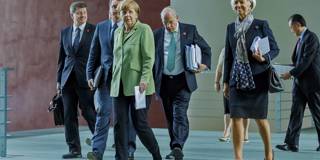Recent rebukes of globalization, such as the UK's Brexit vote and the election of Donald Trump as US president, suggest that the marginalization of the World Trade Organization will continue. But these outcomes may actually have the opposite effect, owing to three key developments.
NEW DELHI – For too long, the World Trade Organization has languished, to lift a reference from T.S. Eliot, by the “waters of Leman” (Lake Geneva). Once the world’s preeminent multilateral trade forum, the WTO has been steadily marginalized in recent years, and recent rebukes of globalization, such as the United Kingdom’s Brexit vote and the election of Donald Trump as US president, suggest that this trend will accelerate. But these outcomes may actually have the opposite effect, owing to three key developments that could enable the revival of the WTO – and of the multilateralism that it embodies.
The first development is the decline of alternative trade arrangements. The WTO reached its peak in the early 2000s, a few years after the Uruguay Round of global trade negotiations concluded, and a time when more countries – most notably China – were acceding to the organization.
But major trade players like the United States and the European Union subsequently shifted their focus from multilateral trade agreements to bilateral, regional, and mega-regional deals. The mega-regionals – namely, the Trans-Pacific Partnership (TPP) and the Transatlantic Trade and Investment Partnership (TTIP) – posed a particularly grave threat to the WTO. Yet those are precisely the deals that the Trump administration is rejecting, or at least postponing.

NEW DELHI – For too long, the World Trade Organization has languished, to lift a reference from T.S. Eliot, by the “waters of Leman” (Lake Geneva). Once the world’s preeminent multilateral trade forum, the WTO has been steadily marginalized in recent years, and recent rebukes of globalization, such as the United Kingdom’s Brexit vote and the election of Donald Trump as US president, suggest that this trend will accelerate. But these outcomes may actually have the opposite effect, owing to three key developments that could enable the revival of the WTO – and of the multilateralism that it embodies.
The first development is the decline of alternative trade arrangements. The WTO reached its peak in the early 2000s, a few years after the Uruguay Round of global trade negotiations concluded, and a time when more countries – most notably China – were acceding to the organization.
But major trade players like the United States and the European Union subsequently shifted their focus from multilateral trade agreements to bilateral, regional, and mega-regional deals. The mega-regionals – namely, the Trans-Pacific Partnership (TPP) and the Transatlantic Trade and Investment Partnership (TTIP) – posed a particularly grave threat to the WTO. Yet those are precisely the deals that the Trump administration is rejecting, or at least postponing.